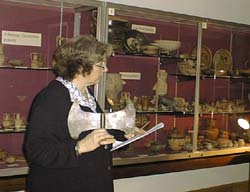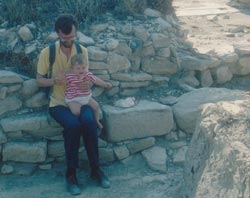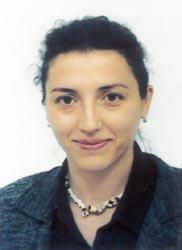Introducing the course team
Ms Lucia Nixon
Magdalen College and St Peter’s College, Oxford
 Ms. Lucia Nixon © Sphakia Survey |
Lucia Nixon is an archaeologist who excavated in the UK, Italy and Turkey before beginning to work on Crete in 1976. She excavated at the University of Toronto site at Kommos in south-central Crete for a number of years, and in 1987 began an archaeological survey in the region of Sphakia, south-western Crete, which she co-directs with Jennifer Moody. She co-directed the Sphakia Survey video and co-produced the Sphakia Survey Web site.
She has taught in several universities in Canada (Calgary, Queens', and the University of New Brunswick at Saint John), and has been teaching in Oxford since 1995. Her published research interests include long-term comparative archaeology, gender and archaeology, sacred landscapes, archaeological reporting, and the cults of Demeter and Kore.
Dr Simon Price
Lady Margaret Hall, Oxford
 Dr. Simon Price © Sphakia Survey |
Simon Price has been teaching ancient history at Oxford University since 1981. He has always been interested in the relations between history and archaeology. His involvement in the archaeology of Crete goes back to 1988 when he joined the Sphakia Survey as project historian. He co-directed the Sphakia Survey video and co-produced the Sphakia Survey Web site.
He has also worked extensively on the religious history of the Graeco-Roman world. He has published seven books, including most recently Religions of Rome (with Mary Beard and John North, 1998), and The Religions of the Ancient Greeks (1999).
Your tutor and their role
 Eva Baboula © Eva Baboula |
Eva Baboula recently completed her archaeology DPhil thesis at Oxford, where she examined the socio-economic dimensions of metalwork buried with Cretans in the Late Bronze Age (roughly 1500–1000 BC). The central question of her work is how people in different areas of the ancient Mediterranean perceived of each other, and how we can tell this from the artefacts they used and exchanged. For example, one of her published papers is a study of the different values embodied in the manufacture, exchange and consumption of mirrors in the central and eastern Mediterranean. Besides her core work as an archaeologist, Eva has also taught Classical Greek at Oxford, and in recent years she has become increasingly interested in the later, post-Byzantine history of Greece. As a Greek herself, she has enormous enthusiasm for the archaeology, heritage, and culture of Crete, and she looks forward to sharing that enthusiasm with the class as she leads it through the varied landscape and fascinating, continuous history of Crete from prehistory to early-modern times.
One of the major differences between this course and other courses of its type around the world is the availability of an online tutor. One of the things that has traditionally made Oxford different from other universities is the tutorial system. Whilst it's almost impossible to replicate a face-to-face tutorial across the Internet, we have tried to give you the best alternative that current technology will reasonably allow.
Your tutor will be your front line of communication with the course. He or she will be the person to whom you talk about your work. Tutors are responsible for ensuring that you participate in all the group activities and that you are not experiencing any difficulties with your study. Your tutor will also provide you with feedback on your assignments.
Development team
OUDCE's Technology-Assisted Lifelong Learning (TALL) group provided course development for this course. TALL was set up in 1996 to create high quality Internet-mediated courses. By combining course development with research into technology-assisted learning, TALL provides online courses with a distinctive Oxford approach - the combination of innovative learning and teaching techniques with individual support. TALL has staff specialised in many areas including learning technology, Web development, graphic design, quality assurance, programming, IT support and project management. Staff from each of these areas contributed to the development of this course. Further information about TALL is available from the TALL Web site:
http://www.tall.ox.ac.ukHelp with non-academic problems
The Alliance is responsible for the administration of the course and for the technical infrastructure from which the course is served. Any queries about your registration for the course, problems with accessing the course materials or any general comments and suggestions should be sent to the Alliance Customer Service Helpdesk.
The Alliance Helpdesk is manned 24 hours a day seven days a week. You can contact the helpdesk by telephone, email or via the Web form on the Alliance Web page. The email address of the Alliance Helpdesk is:
help@allianceforlifelonglearning.orgThe telephone numbers and the Web form for contacting the helpdesk are available from the Alliance Web site at:
http://www.alllearn.org/help.htmlWelcome to the course
Following is a short audiographic which acts as an introduction to the course content and the authors. A PDF transcript is available from the Resources section, should you wish to print this to have whilst viewing the Welcome audiographic.
An introduction to the course content and authors. |